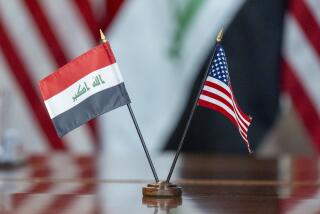5 Arab nations support U.S. in strikes inside Syria
The White House ordered air attacks on Islamic State militants in eastern Syria within 72 hours after five Arab allies agreed to participate in the attacks, the Pentagon’s top officer said Tuesday.
Gen. Martin Dempsey, the chairman of the Joint Chiefs, said the Arab governments only gave assurances they would join the operation over the last three days, prompting President Obama to give the order to commence the operation.
“The coalition came together quickly,” Dempsey told reporters traveling with him in Europe. “Once the coalition came together, that was the condition the president was most interested in.”
The White House withheld approval for strikes in Syria until Arab allies joined the attacks in hopes of showing that major Sunni regimes in the region were uniting against the Sunni extremist group after months of indecision, officials said.
Saudi Arabia, Qatar, United Arab Emirates, Bahrain and Jordan participated in the airstrikes Monday in eastern Syria.
A U.S. official said that all five Arab countries were believed to have joined U.S. warplanes, although it is still unclear how many countries dropped bombs during the operation. The official asked not to be identified to discuss sensitive operational details.
Dempsey said that the first Arab government told U.S. officials that it would participate in attacks on Syria “within the last 72 hours” and that once that occurred, the other four soon promised to participate. He would not identify which country was the first to back the U.S. airstrikes.
“Once we had one of them on board the others followed quickly thereafter,” he said.
The decision to strike came after the Pentagon received intelligence indicating that Islamic State leaders had begun to discuss moving equipment, fighters and leadership out of training camps in eastern Syria to avoid U.S. bombs, Dempsey said.
“There were some initial indications that they were beginning to talk among themselves about how they would have to adapt their tactics,” Dempsey said, adding that the intelligence “was a factor in the decision to strike now before they could make that adaptation.”
Dempsey said he was still awaiting information about how much damage the strikes had inflicted on the militants. The importance was the signal the attacks sent to Islamic State that its fighters, camps, equipment and leadership are vulnerable in Syria, he said.
“We wanted to make sure that ISIL knew they had no safe haven, and we certainly achieved that,” he said, using an acronym for the Islamic State.
The Pentagon did not give Syria’s government advanced warning that the attacks were coming, but he did not rule out that U.S. diplomats at the United Nations in New York might have met with Syrian counterparts to tell them ahead of the airstrikes.
There are still major questions about how committed governments in the region are to helping the U.S. and Iraq, whose government is dominated by Shia Arabs, against the well-armed militants, who have claimed large areas of eastern Syria and western and northern Iraq over the last year.
Having Arab governments as part of the coalition helps “strip away the cloak of religious legitimacy that [Islamic State] has wrapped itself in and point out to these Muslim populations that ISIL is nothing but a perversion of Islam.”
The U.S. also carried out eight air attacks against another militant group, known as Khorasan Group, in the Syrian city of Aleppo. No Arab governments participated in those strikes.
The decision to attack the Khorasan Group at the same time as the airstrikes in eastern Syria was made in part because the Pentagon feared the group’s members would disperse after the first strikes.
“We chose to do them together so we didn’t give them an opportunity if we had done them sequentially to have scattered,” Dempsey said.
The Pentagon said it had intelligence that the Khorasan Group, which Dempsey described as “hard-core” former al Qaeda members with explosives training, were planning an attack in Europe or the U.S.
More to Read
Sign up for Essential California
The most important California stories and recommendations in your inbox every morning.
You may occasionally receive promotional content from the Los Angeles Times.









